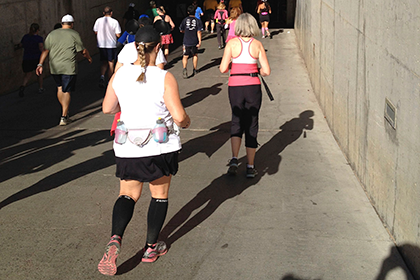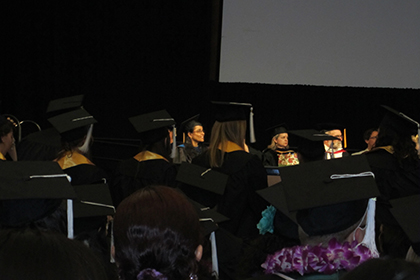Last week, I shared how and why I make exercise a priority. As I was researching my article (and reading my regular health blogs), I stumbled along this post on The Greatist. I was literally turning in my final draft for last week’s article and I already knew I had to write a follow up.
Fitspo, Thinspo, and all other “spos” on Instagram, Facebook, or Tumblr are said to be promoting a healthy lifestyle. But I’m wondering if, more often than not, they might just be distorting our body image and our health even more than before.
The big question is: what is too much exercise?
There are a lot of different articles out there that say you should do this many minutes of exercise a week and this percentage should be cardio and this percentage should be strength training. That’s not what I’m talking about.
I’m talking about exercising to the point where you are damaging your body.
When I was fourteen years old, I played a lot of softball. And I mean, a lot of softball. Between the two JV & Varsity teams, I was one of only three pitchers. That meant I often would play six games a week. If I threw sixty pitches a game, that meant three hundred and sixty pitches a week (not including any practices, warm ups, etc.). As the season would progress, you could slowly see me fall apart—my mechanics, my pitches, my focus—finding the strike zone got harder and harder and it wasn’t my arm.
You see, at fourteen, I wasn’t strong enough to carry a college level-schedule for pitching. That many pitches a week is a lot, even for an eighteen-year-old or a twenty-four-year-old. But I didn’t know that. So I kept pitching. The more tired I got, the shorter my step became, and I started locking my knee. Sure, this gave me a great drop ball, but it also made the ball-and-socket joint in my left hip repeatedly pound against each other. Yeah, it hurt! It hurt a lot and I didn’t know why. The trainer and the coaches just blamed it on fatigue: I would get used to it. Now, I look back and say, “Hell yeah, it was fatigue.” My body was fucking tired, and it was telling me to slow down and take seat. But I was an athlete, I could handle it. I kept playing and a mere six weeks into the season, I tore a tendon in my hip that took a piece of my bone with it. It left in its wake a crack just small enough to not need surgery but serious enough to put me on crutches for eight weeks. I was fourteen, not eighty-five. And what followed was four years of physical therapy (due to continuing alignment issues), knee pain, and back pain. Anytime I go to the running store to get fitted for new shoes, they are surprised I’m a runner because my right leg still supports a majority of my body weight. Perhaps that’s why I enjoy it so much: I wasn’t ever supposed to be good at it again.
The psychological effects of my injury ran deep. I never threw off my high school’s home field pitching mound again. I eventually quit swimming, field hockey, and softball. Maybe if someone had told me not to push myself so hard, I would have enjoyed them through college. Now, as an adult, I shared with you how I make time to exercise regularly. I tried to focus that article on having fun, not burning calories. Why? Well that’s another dangerous line to toe. You know bulimia? The potentially life-threatening eating disorder. People with bulimia may secretly binge—eat large amounts of food—and then purge, try to get rid of the extra calories in an unhealthy way. For example, someone with bulimia may force vomiting or do excessive exercise.
I think often, we forget about that part I put in bold and only focus on the vomiting. I’m not a doctor but I have experienced the obsessive emotions associated with disordered exercising. It’s hard to get them out of your head. You don’t have to be skinny to have them. Yes, being incredibly underweight is a sign you are sick, but so are other things: Is your workout schedule making you lose sleep? Are you constantly stressing about when you can have your next workout? Do you go through a run despite illness or injury? I have. I have obsessed about how to plan my weekend around my workouts. I justify it in some ways because I’m “training for a marathon” and getting enough miles in each week. Or I will sit and look over an entire restaurant menu and plug each and every item in to make sure it’s not too many calories because I only ran five miles today. Most of the time, it means plugging in 10 ingredients per dish to figure out if it’s right and, by the way, that takes forty minutes of my day. WTF, LIZ.
Though I’m really proud of my healthier habits, there are times where I feel my fitness obsession is also my biggest demon. I never feel more alive than I do after a spin class. Running has taught me so much about my limitations and given me confidence in myself I never had before. Early on, running was a way for me to get away from twenty-something stress (work, friends, etc.). But at the same time, I wonder if threw myself into it too fast.
So now, I say: Liz, if you want the damn pastrami melt, get the pastrami melt. I hate this term, but YOLO. Stop wasting hours obsessing over whether you worked out enough to earn that pastrami sandwich. Don’t go home for a run you didn’t plan just because you ate a bit too much. You shouldn’t punish yourself for living life like a normal person. We’re all different. We will find different activities and foods and lifestyles we enjoy. It’s great if you lose ten pounds before summer but if you don’t and you are loving life anyway, that’s all that matters. Go forth!

Photo by Meaghan Morrison

